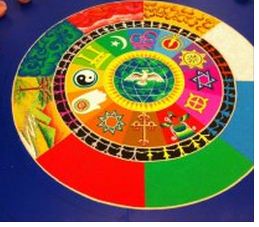The Buddhist Next Door
By James C. Stephens
Little Lisa on The Simpsons Christmas special, tired of the hypocrisy and commercialism of the Springfield church, decides to become a Tibetan Buddhist and is mentored by Richard Gere on prime-time television.
About the same time, John Altschuler, the producer and writer for King of the Hill, is given a book on the Buddha by his wife. He ends up writing a satire for an episode he nicknames, “He Ain’t Heavy, He’s My Buddha.” In this episode, the Hills’ only child, Bobby, is recognized as an American reincarnation of the Lama Sanglug by immigrant monks, putting his father, Hank, through great angst as he unsuccessfully attempts to explain his Methodist worldview to his son. Ever so subtly, and, sometimes blatantly, Buddhism slips in uninvited to comfortable living rooms across America via mainstream media.
This influx of popular Buddhism began in 1960, when Masayasu Sadanaga (George M. Williams), a young student from Japan, stepped onto the UCLA campus with the resolve to introduce “true Buddhism” to America.
In 1970, I was swept up into the excitement of their movement to establish world peace through human revolution while studying political science on the campus of Cal State University Northridge. Thus began my 14-year journey into Buddhism, complete with many practices similar to evangelical Christianity-street witnessing, late-night discussion meetings and the singing of Buddhist sutras set to tunes such as “I’ve Been Working on the Railroad.”
My Buddhist worldview was challenged, however, while visiting Japan on an architecture tour. As I leaned over to put some postcards in my travel bag, someone yelled a warning at me in Japanese. Unfortunately, I didn’t speak Japanese, nor did I have time to move as a 200-pound sign blew over on my back. In shock, I was whisked away in a taxi to the hospital, suffering from a sharp blow to my spinal chord and a partially paralyzed arm. Ironically, the accident report read, “Act of God.”
While lying on several hospital beds in Japan, I struggled with troubling questions about the power of the Buddhist gods to save. After returning to the states, I joined Amway and became consistently exposed to the testimonies of Christians, and observed the importance faith played in their business and marriages. Initially, my wife and I just became more committed to becoming the first successful Buddhist distributors. Evidently, God had other plans.
The following three years were spent aggressively pursuing my business goals, while rubbing shoulders with godly friends who prayed for me, asked me convicting questions and gave me books that answered many of mine. After a month of frightening dreams, weighing the numerous prophecies of Christ with those of the Buddha and wrestling with 2 Peter 3:10 that spoke of the day of the Lord coming like a thief, I sought out a pastor who led me to Christ one hot July afternoon in 1984.
I began to thirst for more than fellowship. Weekly, I searched the church library looking for answers on issues that were of importance to me as a former Buddhist. I searched for books on Christian meditation, but found only those suggesting that Zen meditation made them better Christians. (I knew Zen from my studies and practice, and even as a new Christian saw it as incompatible with the Christian faith.)
This ideology is not confined to books alone. One friend claims that he was healed by his Zen priest’s treatments. Now at his doctor’s advice, he’s practicing Buddhist meditation at home-albeit with a twist: He uses the Lord’s prayer instead of praying to the Buddha. Although claiming to have a love of Christ, he has a very limited understanding of the theological underpinnings of his faith.
This confusion may be traced to the fact that a high percentage of evangelicals no longer believe in the exclusivity of the Christian faith. Instead, according to an August 2005 Beliefnet.com poll, “Eight in 10 Americans-including 68 percent of evangelicals-believe that more than one faith can be a path to salvation, which is most likely not what they were taught in Sunday school.”
Buddhist theology and practice is antithetical to biblical Christianity. For instance, the Buddhist objective in meditation is to empty one’s mind while seeking union with the cosmos, ultimately buying into the Serpent’s ancient lie, “You shall become as gods.”
Since we have already been saved through His grace, we don’t meditate to accumulate merit as would a Buddhist. Through contemplation, we focus our minds on His Word and His works, waiting upon Him and actively listening. Christian meditation takes discipline, but is only fruitful by the grace of God (see 2 Cor. 3:5; 9:8).
So, why do so many Christians neglect to share their faith with Buddhists? Many have willfully chosen to follow the latest popular religious fashions and put their theological mind on hold. According to research by Robert Wuthnow and Wendy Cadge published in Journal for the Scientific Study of Religion (September 2004), “Fifty-six percent of the American public thinks of Buddhists as tolerant, while 63 percent believe them to be peace-loving.”
In its August 2005 survey, Beliefnet.com posed the question, “Can a good person who isn’t of your religious faith go to heaven or attain salvation, or not?” Brace yourself for a shock. While 91 percent of Catholics said yes and 83 percent of non-evangelical Christians said yes, 68 percent of evangelicals said yes as well. Consider how elements of Buddhist ideology have become entwined in our thinking:
A youth pastor at a prominent evangelical church recently rose to the pulpit and gave a report on the success of their recent summer camp. He exclaimed, “It was so great, I thought I died and gone to nirvana.”
Another day, our children-keenly tuned to sniff out Buddhism’s subtle invasion into our culture-shared that their favorite history teacher who was teaching on world religions passed around a little fat Buddha statue and jokingly taught them to rub it for good luck. All this in a preppy private Christian high school in Southern California.
Another friend of mine occasionally travels to India and relayed a story about the many Pentecostals and charismatics he met there who were practicing Tibetan Buddhism. When I asked why, he said, “Most were seeking spiritual experiences, and while they loved Jesus as a teacher, they were not firmly grounded in the Scriptures and went astray as they sought the supernatural.”
We’ve also seen Baptists, Catholics, Methodists, Presbyterians, Episcopalians and Congregationalists slide into Buddhism. One pastor of a local church joined his wife in taking vows at the local Buddhist temple-while retaining his position as senior pastor of the church.
The primary struggle for every generation that is dedicated to missions and evangelism is coming to terms with how does the true gospel get translated into mainstream culture without compromise? How do we keep our faith and maintain our moral and theological standards while still living in the midst of an increasingly pluralistic society?
When an invasive pop culture and its terminology has become the norm, and millions are spent on conveying that message through the media, one cannot passively sit back and live in a 1950s religious cocoon. Daniel and his followers in Babylon faced similar tests of their faith. We are told that the godly will be persecuted. The question is, “Will we remain faithful?”

